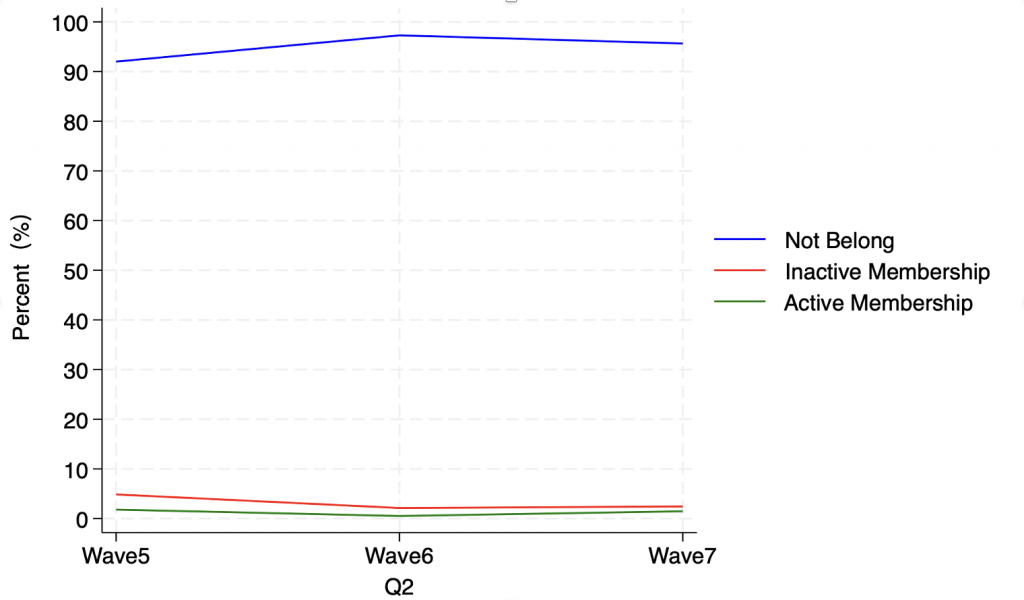In China, do age, education, income, and urbanisation influence attitudes to environmental protection? To find out, Peter Chai analyses survey data gathered from people on the mainland, between 2005 and 2022. Surprisingly, he finds no clear relationships between socio-demographic variables and concern about the environment
Most of the existing research that analyses the relationships between socio-demographic variables and citizens' attitudes to environmental protection uses datasets from Western Europe and North America. To date, there has been scant research on these relationships in East Asia, and mainland China in particular. To address this, I have analysed 17 years' worth of World Values Survey data on citizens in mainland China. My findings reveal no clear demographic patterns in environmental concern.
Ronald Inglehart and Christian Welzel propose a post-materialist model for the relationships between socio-demographic variables and citizen attitudes. They hypothesise that societies with higher educational and economic developments should show higher post-materialist values (also known as self-expression, self-emancipation, and libertarian values). Inglehart and Welzel also posit that a population's post-materialist values should increase through generational replacements.
Most research on citizens' attitudes to environmental protection uses Western datasets. My research using East Asian data aims to address this
Taking this to the individual level, they hypothesise that more educated, wealthier, and younger citizens should express higher post-materialist values. But can these Western socialisation theories about age and education, and scarcity hypotheses about income and urbanisation, work in an East Asian context? Does 'Asian uniqueness' in value patterns exist?
To find out, I focus on concern about the environment as an example of post-materialist values. I test whether more educated, wealthier, and younger citizens express higher environmental concern in mainland China, a natural laboratory with large geographical and demographical variations. My findings provide insights into how citizens perceive environmental protection, and who participates in environmental movements.
One question in the World Values Survey asks respondents whether protecting the environment should take priority over economic growth. Another asks respondents about their memberships of, and activeness in, environmental organisations. I analysed the responses to these two questions in the latest three waves of the World Values Survey.
My findings show an increasing trend for Chinese citizens – especially better-educated ones – prioritising environmental protection
My findings show an increasing trend for prioritising environmental protection. They also show that citizens' membership of environmental organisations is consistently low. Yet regression results, controlled with gender and marital status, show that different demographic variables perform very differently for the two questions and the three waves. In some cases, the demographic variables do not correlate with the questions in the directions expected by the socialisation and scarcity hypotheses.
Education seems to work better than other demographic variables, but in general few demographic variables appear good predictors of environmental concern:


Looking at attitudes to environmental protection in Hong Kong and Taiwan from the same survey data, I find an increasing trend for prioritising environmental protection in Taiwan but not Hong Kong. I find no consistent demographic patterns across question items and waves for either Hong Kong or Taiwan.
With the help of the latest three waves of Asian Barometer data, I also looked at other examples of post-materialist values, such as attitudes to family structure and gender roles. I analysed the responses to four questions asking whether respondents agree that individuals should prioritise their families and take orders from their parents; that wives should listen to mothers-in-law; and that parents should prefer baby boys over baby girls.
My findings show that the trend for traditional family and gender values is not in decline, and that the same demographic variables perform very differently for the four question items and three waves, and across mainland China, Hong Kong, and Taiwan. The differences in regression results across the three regions risk overgeneralisation if we analyse the Greater China area as a whole.
Younger, better educated, wealthier and younger citizens do not necessarily express more post-materialist attitudes
The case studies of attitudes to environmental protection, and to family and gender, show that younger, more educated, and wealthier citizens do not necessarily express higher post-materialist values. The post-materialist model does not seem to work well, and ‘Asian uniqueness’ does indeed seem relevant in the context of the greater China area. There are, as yet, no qualitative explanations for this inconsistency.
Some researchers hold that Confucianism has held back post-materialism. To me, this is not an adequate explanation because it embodies a collection of somewhat vague, multifaceted, and opposing doctrines. More survey data, research methods, and comparisons with other East Asian societies and developing regions, could provide more informative explanations.